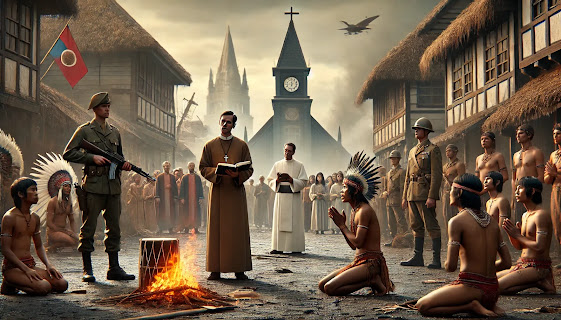Did You Know?
That Millions of Lives Were Lost
in the Name of Christianity
From its inception, Christianity has faced and provoked significant conflict. The early Christians, proclaiming a radical new faith, often found themselves at odds with the Roman Empire. The Roman persecutions, occurring sporadically from the first to the fourth centuries, saw thousands of Christians martyred. These early believers, steadfast in their faith, faced brutal executions for refusing to renounce their belief in Christ. "The blood of the martyrs became the seed of the Church, yet it also sowed deep divisions and hostilities" (Frend, 1965).
As Christianity transitioned from a persecuted faith to the state religion of the Roman Empire, its influence grew exponentially. However, this newfound power also led to periods of intense violence. The Crusades, a series of religious wars initiated by the Latin Church in the medieval period, aimed to reclaim the Holy Land from Muslim rule. These wars, spanning from 1096 to 1291, resulted in the deaths of hundreds of thousands of Christians, Muslims, and Jews. "The Crusades were marked by unprecedented levels of violence and a zeal that blurred the lines between piety and cruelty" (Riley-Smith, 1987).
The Inquisition further exemplifies the violent history of Christianity. Established to combat heresy and ensure doctrinal purity, the Inquisition led to the persecution and execution of thousands over several centuries. The Spanish Inquisition, in particular, is notorious for its ruthless methods and significant death toll. "The Inquisition serves as a dark reminder of the lengths to which religious institutions will go to maintain orthodoxy" (Kamen, 1997).
The European Wars of Religion, spanning the 16th and 17th centuries, were another dark chapter. These wars, fueled by the schism between Catholics and Protestants, resulted in immense devastation. The Thirty Years' War (1618-1648), one of the most destructive conflicts in European history, caused millions of deaths. "Religious conflict during this period was not just a matter of faith, but also a struggle for political and territorial dominance" (Parker, 1984).
Colonialism further spread Christianity, but often at a dire human cost. European colonial conquests in the Americas, Africa, and Asia frequently involved the forcible conversion of indigenous populations. The spread of disease, warfare, and the imposition of new cultural norms led to the deaths of countless native people. "The missionary zeal of colonial powers was frequently accompanied by violence and cultural destruction" (Nunn, 2008).
In light of this history, the question arises: How do we reconcile the message of love and salvation at Christianity's core with the violence that has accompanied its spread? Understanding this duality is crucial. "The paradox of a faith that preaches peace yet often spreads through violence is one of the central tensions in Christian history" (Cunningham & Grell, 2000). The millions of lives lost in the name of Christianity are a sobering testament to the complex legacy of the faith. They remind us of the importance of examining history with a critical eye, acknowledging both the profound spiritual contributions and the deep scars left by religious conflict.
As we reflect on the question of whether millions had to die to make people believe in the divine sacrifice of Jesus, we are invited to ponder the intersections of faith, power, and human frailty. "History teaches us that the propagation of faith is often entangled with the exercise of power" (Armstrong, 1993). The historical record is a tapestry of devotion, conflict, and tragedy. By learning from this history, we can strive for a future where the principles of love, peace, and compassion truly guide our actions, honoring the core message of Christianity without repeating the mistakes of the past.
By Claude D. Rhodes 32*
References
- Armstrong, K. (1993). A History of God: The 4,000-Year Quest of Judaism, Christianity, and Islam. Ballantine Books.
- Cunningham, A., & Grell, O. P. (2000). The Four Horsemen of the Apocalypse: Religion, War, Famine and Death in Reformation Europe. Cambridge University Press.
- Frend, W. H. C. (1965). Martyrdom and Persecution in the Early Church: A Study of a Conflict from the Maccabees to Donatus. Blackwell.
- Kamen, H. (1997). The Spanish Inquisition: A Historical Revision. Yale University Press.
- MacCulloch, D. (2010). Christianity: The First Three Thousand Years. Viking.
- Nunn, N. (2008). "The Long-Term Effects of Africa's Slave Trades". The Quarterly Journal of Economics, 123(1), 139-176.
- Parker, G. (1984). The Thirty Years' War. Routledge.
- Riley-Smith, J. (1987). The Crusades: A History. Yale University Press.





Comments
Post a Comment